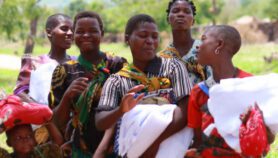Send to a friend
The details you provide on this page will not be used to send unsolicited email, and will not be sold to a 3rd party. See privacy policy.
Below is a round up of news from or about Sub-Saharan Africa for the period 23 April–8 May.
First African study of irradiated malaria mosquitoes
Sudanese researchers from Khartoum’s Tropical Medicine Research Institute have successfully sterilised malaria-carrying Anopheles arabiensis mosquitoes through irradiation before releasing them to mate with wild females. This is the first time the genetic control technique had been tested in Africa. More>> [kB]
African researchers get access to US rice
Researchers and smallscale farmers across Africa will have access to newly developed rice from US company Arcadia Biosciences, thanks to a deal struck with the Kenya-based African Agricultural Technology Foundation. Arcadia will provide improved rice lines for field tests and access to research to improve traits such as higher-yields and salt tolerance. More>>
Scale up ARV rollout or risk 1.2 million more deaths, researchers warn
Maintaining the current timeline for rolling out HIV antiretroviral (ARV) drugs rather than rapid scale up could cost about 1.2 million more South African lives by 2012, a mathematical model suggests. Writing in the Journal of Infectious Diseases, researchers emphasise the need to monitor patients for their CD4 white blood cell count, which led to fewer deaths under all scenarios considered. More>> [kB]
Africa ‘must prepare for cancer epidemic’
Twalib Ngoma, director of Tanzania’s Ocean Road Cancer Institute, and colleagues warn thatinexpensive and effective cancer control programmes need to be established in all African countries. Writing in Nature Reviews Cancer the authors note thatmany cancers are preventable, or treatable, if detected early enough. More>>
Zimbabwe study emphasises important role of farmers in research
‘Top-down’ agricultural research efforts, where farmers are reduced to just adopters of seed varieties, risk failure unless farmers are better included in seed development. Research from the Bindura University of Science Education in Zimbabwe found that when consulted, local smallholder farmers choose maize varieties that resist drought and disease and avoid long-season high-yielding varieties. More>> [100kB]
Nutrient supplements ‘reduce risk of TB reinfection’
A randomised trial of nearly 900 Tanzanians found that doses of micronutrients reduced the risk of tuberculosis (TB) infection recurring. Use of vitamins A, B, C and E and the nutrient selenium had a particularly helpful effect on roughly half of HIV-infected patients, who often suffer from reactivated TB. More>>
South Africa to award radiotelescope construction contracts
Contracts to make the first seven satellite dishes for South Africa’s MeerKAT array of radio telescopes will be issued within a month, with building scheduled for October. A single 12-metre-wide prototype dish is undergoing engineering tests at the Hartbeeshoek radio astronomy observatory near Pretoria. More>>
Research highlights mother-to-child cytomegalovirus risk in the Gambia
Researchers from the Medical Research Council laboratories in Fajara in the Gambia say that 85 per cent of nearly 300 children studied were infected with the cytomegalovirus within a year of birth, most likely from their mother either during or after birth. The virus has been implicated in birth defects and can be life-threatening for immunocompromised patients. More>>
Scientists suggest improvements for Burkina Faso dairy farming
Research from the University of Bobo-Dioulasso in Burkino Faso suggests that crossbreeding and extensive supplementation of cattle diets with cottonseed cake improves milk production. The researchers also highlight the urgent need for milk cooling systems at both dairy farms and at milk collection centres if malnutrition and food insecurity is to be addressed. More>> [357kB]
Madagascar study sheds light on viral agents of childhood gastroenteritis
A study of human astroviruses has found that they are important agents of acute dehydrating gastroenteritis among children younger than 24 months in Madagascar. Researchers from the Pasteur Institute in Antananarivo say simultaneous circulation of different types of the virus was relatively common. More>>
Compiled by Christina Scott. Additional reporting by Zablon Odhiambo.
If you would like to suggest a story for this news in brief, please contact the Africa News Editor Christina Scott ([email protected]).













